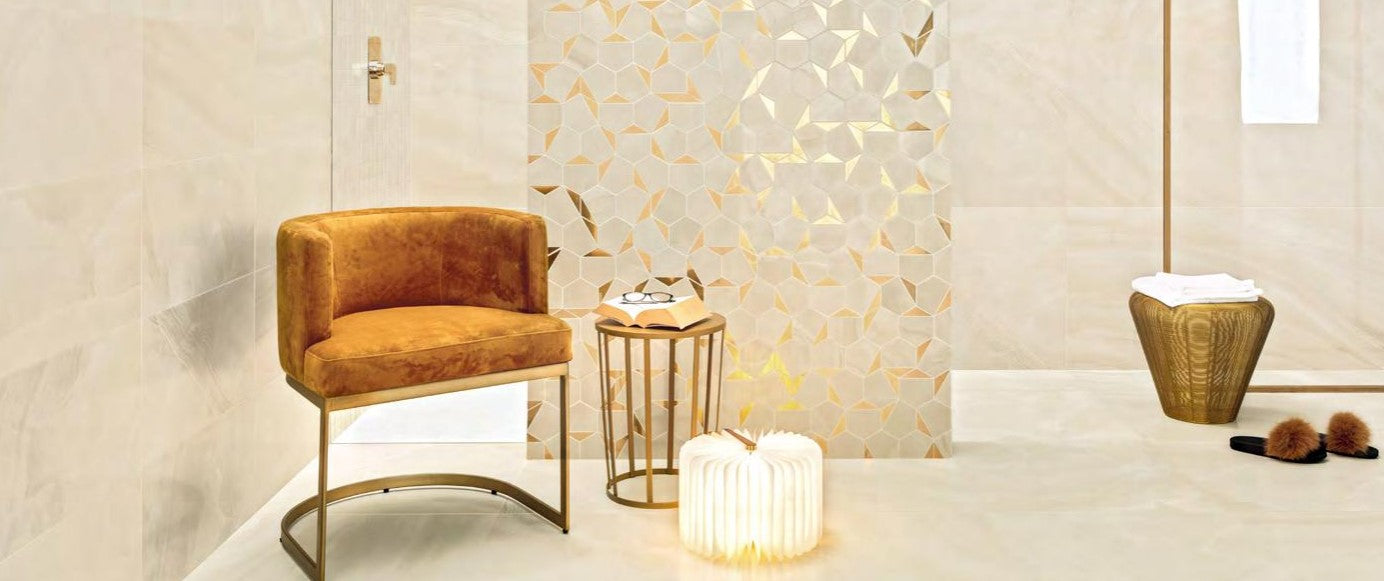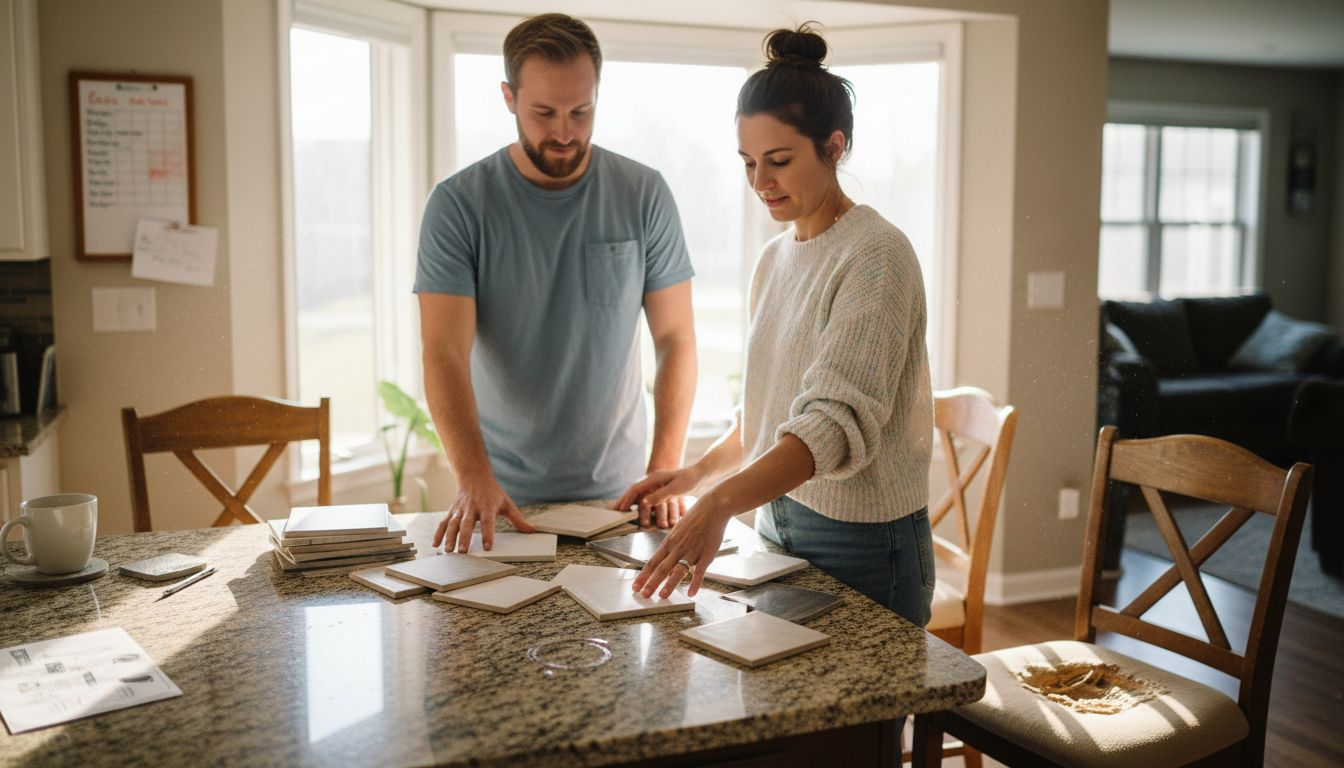Looking for a flooring option that's both versatile and durable? Porcelain tiles might be what you need. They're great for both homes and businesses, with many styles, finishes, and sizes to choose from.
Porcelain tiles are made from top-quality materials. They can handle lots of foot traffic. Whether you want to refresh your kitchen, bathroom, or any other room, porcelain tiles offer endless possibilities.

Key Takeaways
- Porcelain tiles are highly durable and suitable for high-traffic areas.
- They are low-maintenance, resistant to stains, and do not require sealing.
- Porcelain tiles are versatile, with many sizes, shapes, and finishes available.
- Outdoor porcelain tiles can handle harsh weather.
- Porcelain tiles can give your home a cohesive, beautiful look.
Introduction to Porcelain Tiles
Porcelain tiles have been popular for over a century. They are used in homes and businesses. These tiles are versatile and can be found in kitchens, bathrooms, living rooms, and outdoor areas.
Advantages of Porcelain Tiles
Porcelain tiles are more durable than ceramic tiles. They are made at high temperatures, up to 1,220°C. This makes them strong and resistant.
They have a very low water absorption rate, less than 0.5%. This makes them waterproof, perfect for wet areas like kitchens and bathrooms. They also last long in busy places, thanks to their durability.
Versatility of Porcelain Tiles
Porcelain tiles come in many designs, colors, and sizes. They fit different tastes and styles. You can choose from glossy to matte finishes.

Full-body porcelain tiles are the most durable. They resist scratches, moisture, chemicals, and heat. This makes them a top choice for flooring.
Determine Your Needs
Before you start looking for porcelain tiles, think about how they'll be used. Will they handle lots of foot traffic, or are they for a private area? Also, consider if they'll be exposed to moisture or chemicals. Knowing these details helps you choose the right size, type, and design for your project.
Considerations for High-Traffic Areas
In busy spots like living rooms or entryways, durability is key. Look for porcelain tiles with a high PEI rating. These tiles can handle lots of use without losing their looks.
Moisture and Chemical Resistance
In wet places like bathrooms or outdoor areas, choose tiles that resist water and chemicals. Glazed ceramic tiles are good for these spots because they're water-resistant. But, they can be slippery. Unglazed matte tiles offer better grip and also protect against moisture.
"Porcelain tiles are a fantastic choice for high-traffic areas and moisture-rich environments, as they are durable, stain-resistant, and easy to maintain."
By thinking about your space's needs, you can find the best porcelain tiles. They'll make your home look great and last through daily life.
Explore the Look and Feel
Porcelain tiles open up a world of design possibilities. They let you create stunning interiors that show off your personal style. You can choose from natural stone finishes like marble and granite or find coordinating styles for a cohesive look. The choices are endless.
Natural Stone Finishes
Porcelain tiles with natural stone finishes like marble and granite bring luxury into your home. They mimic the beauty of natural stone but are more durable and easy to care for. Whether you love the elegance of marble or the rugged look of granite, porcelain tiles can help you get the look you want.

Coordinating Styles for a Cohesive Look
- Explore Raphael Porcelain's 10 distinct tile collections, each with a variety of styles and finishes.
- With options like marble-look, wood-look, and limestone-look, you can mix porcelain tiles across rooms for a cohesive look and coordinating styles.
- This focus on detail helps you achieve a polished, designer-inspired look that ties your space together.
"Porcelain tiles allow me to achieve the perfect balance of style and function in my home. The natural stone finishes and coordinating options make it easy to curate a space that is both visually stunning and highly durable."
- Sarah, Homeowner
Durability Matters
Investing in high-quality porcelain tiles is key for long-lasting floors. Porcelain tiles are known for their durability. They resist chipping, scratching, and daily wear well. This makes them perfect for high-traffic areas.
Not all porcelain tiles are the same. The porcelain tile quality can differ a lot. When picking tiles, think about your space's needs. Choose a tile that can handle the use it will get.
Porcelain tile is a great pick for any project. It's made from top materials and lasts long. These tiles resist chipping and scratching well. Your floors will look new for years.
| Porcelain Tile Durability Metrics | Raphael Porcelain Tiles | Industry Average |
|---|---|---|
| Mohs Hardness Scale | 8-9 | 6-8 |
| Abrasion Resistance | PEI 5 | PEI 3-4 |
| Freeze-Thaw Cycles | Passes | Varies |
Choosing Porcelain tiles means your floors will last in busy areas. They offer a durable, lasting solution that improves your space's look.
Porcelain tiles Size Options
Porcelain tiles come in a wide range of sizes. You can find everything from small mosaics to big panels. These tiles can change how your living areas look and feel. They offer both beauty and practical use.
Small Mosaic Tiles
Small porcelain tiles, like mosaics, are great for detailed designs. They measure 0.25 by 0.25 inch or 0.5 by 0.5 inch. These tiny tiles are perfect for adding depth to your spaces.

They work well on bathroom walls, kitchen backsplashes, and as accent pieces. They help create a unique and eye-catching look.
Large Format Tiles
Porcelain tiles also come in big sizes, up to 10 by 15 feet. These large tiles make your space look modern and open. They're great for big walls or open layouts.
Common sizes include 24 by 24 inches, 36 by 36 inches, and 48 by 48 inches. Whether you like small mosaics or big tiles, there's a lot to choose from. Find the right size for your space and let your creativity flow.
Maintenance and Care
To keep your porcelain tiles looking great, follow a few easy steps. It doesn't matter if you have textured or polished tiles. Just make sure to clean and seal them as the manufacturer suggests.
Textured vs. Polished Tiles
Textured or matte porcelain tiles might need sealing to avoid stains and spills. Their surface is a bit porous, so liquids can soak in if not sealed. Polished tiles, with their smooth, shiny surface, are better at resisting stains and are easier to clean.
Cleaning and Sealing Tips
- Regularly sweep or vacuum porcelain tiles to remove dirt and debris.
- Mop with a pH-neutral cleaner or mild detergent solution. Avoid harsh chemicals or abrasive cleaners.
- Polished tiles may need more frequent cleaning to maintain their shine.
- Textured tiles should be sealed according to the manufacturer's instructions to prevent stains and water damage.
- Grout should be sealed 72 hours after installation and resealed periodically to protect against moisture and stains.
- Consider using a penetrating or impregnating sealer to enhance the tiles' stain resistance and longevity.
By following these easy porcelain tile maintenance tips, you can keep your textured tiles and polished tiles looking amazing for years. Regular cleaning and sealing will make your investment in quality porcelain tiles worthwhile. It will ensure your tiles stay beautiful and functional for a long time.
| Tile Type | Cleaning | Sealing |
|---|---|---|
| Textured Porcelain | Sweep, vacuum, mop with pH-neutral cleaner | Seal according to manufacturer instructions |
| Polished Porcelain | Sweep, vacuum, mop frequently to maintain shine | No sealing required |
Slip Resistance Ratings
When picking porcelain tiles for your home, think about the slip resistance rating. This is key in bathrooms and kitchens. High slip resistance can prevent accidents and make wet areas safer.
Floor tiles' slip resistance is measured by R-values. These range from R9 (minimum) to R13 (highest). The tile industry uses the ISO 10545 system to classify tiles by slip resistance. Class 1 has a dynamic Coefficient of Friction of 0.4.
- R9 tiles have a COF of
- R10 tiles have a COF of >0.2 and
- R11 and R12 tiles have a COF of >0.4 and
- Porcelain tiles with an R rating of 11 are recommended for outdoor spaces like gardens.
- Porcelain tiles with R ratings of 9 or 10 are ideal for internal living areas that connect to dining spaces.
For a safe and fun experience, choose porcelain tile with a Coefficient of Friction (COF) of 0.60 or more. Raphael Porcelain offers wall and flooring tiles with this slip resistance. They meet the ANSI A137.1 standard for tile flooring in level interior spaces.
| R-Value | COF Range | Recommended Applications |
|---|---|---|
| R9 | Dry areas only | |
| R10 | >0.2 and | Kitchens, living rooms (when wet) |
| R11 and R12 | >0.4 and | Bathrooms, kitchens, swimming pools, shopping centers |
| R11 | >0.4 | Outdoor spaces like gardens |
| R9 or R10 | >0.2 and | Internal living areas connected to dining spaces |
By picking porcelain tiles with the right slip resistance rating, you make your home safer. This is very important in areas where water and moisture are common.
Quality Certifications
When picking porcelain tiles for your home, look for certifications from trusted groups. These ensure the tiles are strong, durable, and perform well. Some top certifications include:
- NSF (National Sanitation Foundation) certification, which shows the tiles are safe for food areas
- Greenguard certification, which means the tiles have low VOC emissions, great for indoor use
- USGBC (U.S. Green Building Council) LEED certification, which checks the tiles' sustainability and environmental impact
Most Porcelain floor and wall tiles are certified by these groups. This means you can trust their quality and safety.
| Certification | Description |
|---|---|
| EU EMAS (Eco-Management and Audit Scheme) | A voluntary tool for businesses to improve their environmental performance. |
| ISO 50001 certification | Helps companies keep improving their energy use to cut down on emissions and costs. |
| ISO 9001 certification | A global standard for managing a company from start to finish. |
| ISO 14001 certification | Shows a company's efforts to protect the environment. |
| ISO 45001:2018 certification | Focuses on keeping workplaces safe through health and safety management. |
| GREENGUARD Certification | Ensures the tiles have low emissions for indoor use. |
| GREENGUARD Gold Certification | Perfect for places like schools and healthcare facilities. |
Choosing porcelain tiles with these certifications means you're getting a top-notch product. It's safe, durable, and eco-friendly.
Budget-Friendly Options
Finding the right balance between quality and price is key when updating your home with porcelain tiles. Porcelain tiles can cost from a few dollars to hundreds per square foot. But, you don't have to spend a lot to get the look you want.
Look for budget-friendly options that offer great value. Porcelain tiles usually cost between $2 and $30 per square foot. Professional installation can add $7 to $20 more per square foot. By choosing tiles in the $5 to $10 range, you get durability and beauty without overspending.
Choose tiles that are both affordable and of good quality. Don't go for the cheapest tiles, as they might chip or crack easily. Instead, find reputable brands that offer quality at a lower price.
Consider doing the installation yourself to save on labor costs. With the right tools and some effort, you can get a professional look without the extra cost. Online tutorials and guides can help you through the process.
"Investing in quality porcelain tiles, even on a budget, can pay dividends in the long run. The durability and timeless aesthetic make it a worthwhile investment for any home renovation."
To find affordable porcelain tiles, balance cost and quality. Research online, and try DIY installation. This way, you can update your space with beautiful, lasting tiles without breaking the bank.
Installation Considerations
Porcelain tiles are known for their durability and beauty. But, installing them can be tricky, more so with large format tiles. You might need special tools and techniques for a perfect finish.
When you're installing porcelain tiles, think about the tile size, the subfloor, and how you'll apply the adhesive. Big tiles are heavy and hard to move. This makes DIY installation a big challenge. It might be better to get a professional installation team for a smooth and lasting result.
But, porcelain tiles can also be installed by yourself if you prepare well and use the right tools. Make sure the subfloor is clean, level, and ready for the tiles. Also, learning how to mix and apply adhesive is key to a great finish.
Whether you do it yourself or hire a pro, know what your porcelain tiles need. Things like temperature, curing time, and grouting methods are important for success.
Understanding the special needs of porcelain tile installation helps you get a beautiful and lasting result. This will make your space look even better.
Conclusion
Choosing the right porcelain tiles for your home is all about your style, budget, and how durable you need them to be. This article has given you the tools to make a smart choice. Your choice will add beauty and function to your space for years.
Porcelain tiles are very durable, lasting up to 50 years with the right care. They're great for places that get a lot of use because they resist damage, stains, and water well. Plus, they come in many designs, helping you create a beautiful look in your home.
Whether you're updating your home or building a new one, choosing quality porcelain tiles is a smart move. Think about your budget and what you need for installation. This way, you can find the perfect tiles to make your home look amazing and match your design dreams.
FAQ
What are the advantages of porcelain tiles?
Porcelain tiles are denser and more complex than ceramic tiles. They are more resistant to moisture, stains, and wear. They are fired at a higher temperature, making them more durable.
How versatile are porcelain tiles?
Porcelain tiles come in many colors, textures, and patterns. They even mimic natural stones like marble and granite. This makes it easy to find the perfect tile for any style.
What factors should I consider when choosing porcelain tiles?
Think about how the tiles will be used and the environment they'll face. For example, high-traffic areas or places with moisture. This helps decide on the right size and type of tile.
How can I create a cohesive look throughout my home with porcelain tiles?
Choose similar or coordinating styles for different rooms. Options like marble-look, wood-look, or limestone-look can help tie everything together.
How do I ensure I'm choosing durable porcelain tiles?
For high-traffic areas, pick a tile that's less likely to chip or scratch. Raphael Porcelain tile is a reliable choice for its durability.
What are the size options for porcelain tiles?
Porcelain tiles range from small mosaic tiles to large format tiles. Smaller tiles can make a space look bigger. Larger tiles create a modern, unified look.
How do I properly maintain and care for porcelain tiles?
Regularly sweep or vacuum to remove dirt. Mop with a mild detergent or pH-neutral cleaner. Textured or porous tiles might need sealing. Polished tiles may need more frequent cleaning to keep their shine.
How can I ensure porcelain tiles are slip-resistant?
Choose tiles with a high slip resistance rating, like an R rating of 10 or a COF rating of at least 0.60. This prevents accidents in bathrooms or kitchens.
What certifications should I look for in quality porcelain tiles?
Look for tiles certified by NSF, Greenguard, and/or USGBC. These certifications ensure the tiles meet strength, durability, and performance standards.
How can I find budget-friendly porcelain tile options?
It's important to stay within your budget. But don't settle for the cheapest tiles. They might be of lower quality and more prone to damage. Look for tiles that offer a good balance of quality and price, as there are often deals and discounts.
What are the considerations for porcelain tile installation?
Porcelain tiles can be heavy and hard to install, even for large format tiles. If you're not comfortable with the process, consider hiring a professional. But, with proper preparation and the right tools, you can also install them yourself.





